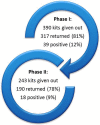Engaging health systems to increase colorectal cancer screening: community-clinical outreach in underserved areas of Wisconsin
- PMID: 24262024
- PMCID: PMC3839589
- DOI: 10.5888/pcd10.130180
Engaging health systems to increase colorectal cancer screening: community-clinical outreach in underserved areas of Wisconsin
Abstract
Background: Colorectal cancer is the fourth most commonly diagnosed cancer and the second leading cause of cancer-related death in Wisconsin. Incidence and mortality rates for colorectal cancer vary by age, race/ethnicity, geography, and socioeconomic status. From 2010 through 2012, the Wisconsin Comprehensive Cancer Control Program awarded grants to 5 regional health systems for the purpose of planning and implementing events to increase colorectal cancer screening rates in underserved communities.
Community context: Grantees were chosen for their ability to engage community partners in reaching underserved groups including African American, Hispanic/Latino, Hmong, rural, and uninsured populations in their service areas.
Methods: Grantees identified target populations for proposed screening events, designated institutional planning teams, engaged appropriate local partner organizations, and created plans for follow-up. All grantees implemented 1 or more colorectal cancer screening events within 6 months of receiving their awards. Events were conducted in 2 phases.
Outcomes: Participating health systems organized 36 screening events and distributed 633 individual test kits; 506 kits were returned, of which 57 (9%) tested positive for colorectal abnormalities. Of attendees who received screening, 63% were uninsured or underinsured, 55% had no previous screening, 46% were of a racial/ethnic minority group, 22% had a family history of cancer, and 13% were rural residents. This project strengthened partnerships between health systems and local organizations.
Interpretation: An effective strategy for improving colorectal cancer screening rates, particularly among underserved populations, is to award health systems grants for implementing community-based screening events in conjunction with community partners.
Figures


Similar articles
-
Colorectal cancer screening pilot program for underserved women in Cumberland County, Maine.J Community Health. 2010 Apr;35(2):109-14. doi: 10.1007/s10900-009-9204-2. J Community Health. 2010. PMID: 20033837
-
Race/Ethnicity and Adoption of a Population Health Management Approach to Colorectal Cancer Screening in a Community-Based Healthcare System.J Gen Intern Med. 2016 Nov;31(11):1323-1330. doi: 10.1007/s11606-016-3792-1. Epub 2016 Jul 13. J Gen Intern Med. 2016. PMID: 27412426 Free PMC article.
-
Engaging diverse underserved communities to bridge the mammography divide.BMC Public Health. 2011 Jan 21;11:47. doi: 10.1186/1471-2458-11-47. BMC Public Health. 2011. PMID: 21255424 Free PMC article. Clinical Trial.
-
Challenges and possible solutions to colorectal cancer screening for the underserved.J Natl Cancer Inst. 2014 Apr;106(4):dju032. doi: 10.1093/jnci/dju032. Epub 2014 Mar 28. J Natl Cancer Inst. 2014. PMID: 24681602 Free PMC article. Review.
-
Colorectal cancer care equity in underserved communities: Innovative solutions for screening, outreach & capacity in rural Washington.Am J Surg. 2025 May;243:116246. doi: 10.1016/j.amjsurg.2025.116246. Epub 2025 Feb 13. Am J Surg. 2025. PMID: 39986209 Review.
Cited by
-
Concept analysis of community health outreach.BMC Health Serv Res. 2020 May 13;20(1):417. doi: 10.1186/s12913-020-05266-7. BMC Health Serv Res. 2020. PMID: 32404160 Free PMC article. Review.
-
A systematic review of components of community-based organisation engagement.Health Soc Care Community. 2018 Jul;26(4):e474-e484. doi: 10.1111/hsc.12533. Epub 2018 Jan 4. Health Soc Care Community. 2018. PMID: 29314373 Free PMC article.
-
Timeliness of Colonoscopy After Abnormal Fecal Test Results in a Safety Net Practice.J Community Health. 2016 Aug;41(4):864-70. doi: 10.1007/s10900-016-0165-y. J Community Health. 2016. PMID: 26874943 Free PMC article.
-
Colorectal cancer screening: Understanding the health literacy needs of hispanic rural residents.AIMS Public Health. 2019 Apr 1;6(2):107-120. doi: 10.3934/publichealth.2019.2.107. eCollection 2019. AIMS Public Health. 2019. PMID: 31297397 Free PMC article.
References
-
- Wisconsin cancer facts and figures. Madison (WI): American Cancer Society, Wisconsin Division of Public Health; 2011. http://action.acscan.org/site/DocServer/WI_FactsFigures_2010_120710_L9.p.... Accessed May 14, 2013.
-
- Screening for colorectal cancer: US Preventive Services Task Force recommendation statement. Agency for Healthcare Research and Quality; 2008. http://www.uspreventiveservicestaskforce.org/uspstf08/colocancer/colors.htm. Accessed May 15, 2013. - PubMed
Publication types
MeSH terms
Grants and funding
LinkOut - more resources
Full Text Sources
Other Literature Sources
Medical

